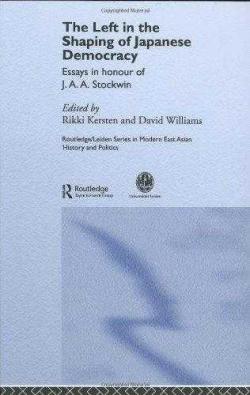The Left in the Shaping of Japanese Democracy: Essays in honour of J.A.A. Stockwin

Edited by Rikki Kersten and David Williams
Routledge, 2006
ISBN-13: 978-0415334341
Review by Sir Hugh Cortazzi
This festschrift was presented to Professor Arthur Stockwin at a reception at Daiwa House in London on 21 February 2006 as a tribute from former graduate students on his retirement as Professor at the Nissan Institute at Oxford. As Rikki Kersten in her tribute at the beginning of this book states Arthur Stockwin has made a singular contribution to the study of modern Japanese politics. He has asserted: "the ongoing importance of understanding Japan in the post-Cold War, unipolar world. The facile dismissal of Japan as a nation of relevance on the basis of economic performance alone is not merely wrong, but as Arthur tells us, it would make us miss one of the most exciting periods in the history of political reform in Japan."
Arthur has covered a wide spectrum in his study of Japanese politics and his books such as Governing Japan: Divided Politics in a Major Economy and The Dictionary of Modern Japanese Politics will remain invaluable to students for a long time.
Arthur who had not seen the book in advance but knew that it was devoted to the left in Japanese politics gave those present a masterly if inevitably brief expose of the way in which the opposition to the Liberal Democratic Party had developed over the last sixty years. In this he made some interesting comparisons with Britain reminding his audience of the importance for a healthy parliamentary democracy of having a potentially electable opposition party. He noted that the Democratic Party was an amorphous coalition which posed little threat to LDP dominance. In the past the various left wing parties had at least been able to ensure that the LDP did not get its way all the time.
It is perhaps a pity that this festschrift is devoted primarily to the 'left' in Japanese politics but Arthur did ensure in his writings that the opposition parties were not just written off by political scientists as irrelevant. So the choice of theme for the symposium on which this volume is based is understandable.
Inevitably in a volume which covers themes from the late Meiji to the present day the essays are of varying quality and interest to the non-expert reader. The first part is devoted to "Left-wing thought from the Russian Revolution to the war on terrorism." The essays in this section by Christopher Goto-Jones and Rikki Kersten draw particular attention to the anti-capitalist trends in the pre-war Japanese army and the influence this had on Japanese left-wing thinkers. Rikki Kersten in her essay "Painting the Emperor red: the Emperor and the socialists in the 1930s" concludes: "The Left were self-deceived, in that they came to believe that the Emperor would, in a fashion, represent their cause. The political utility of Emperor made him a chameleon, and red was only one of the many colours he wore."
Part II "The Metamorphosis of the left in post-war Japan" begins with an interesting essay on "The rise and fall of Nikkyoso" by Robert Aspinall which is a good summary of the activities and attitudes of one of the most political left-wing Japanese unions. He notes the dichotomy in the Ministry of Education which wanted on the one hand to impose nationalistic policies but at the same time was being urged to encourage greater individualism. The other essays in this part by Koichi Nakano and Sarah Hyde and two of the essays in part III by Leonard Schoppa and Junji Banno also provide useful analyses of the development of the opposition in Japanese politics and of the decline of socialism.
The two articles by David Williams, co-editor of this book, seem out of place in a festschrift. He quickly lost me in his first article on "Japanese evasion of sovereignty." The second entitled "After Abu Ghraib: American empire, the left-wing intellectual and Japanese Studies" reads like an anti-American rant, which would be more appropriate for a polemical pamphlet than for a scholarly book. It also reminds us that extreme 'left' and extreme 'right' often have much in common.

